
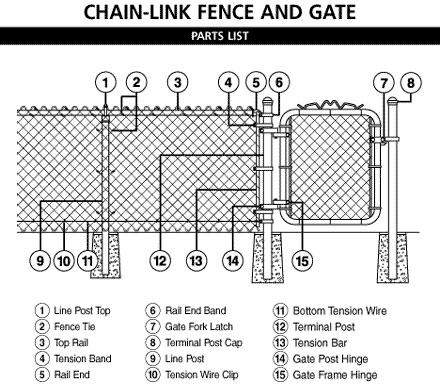
It's important to check:
That fence footings don't exceed legally established property lines. If you're uncertain, refer to a real estate agent's line plot, or consult a professional surveyor.
Local codes for specifications regarding frontage locations, allowable fence heights, etc. A permit may be required.
View a printable parts and materials shopping list.
Check your local building codes or Home Owner's Association regulations before installing a fence.
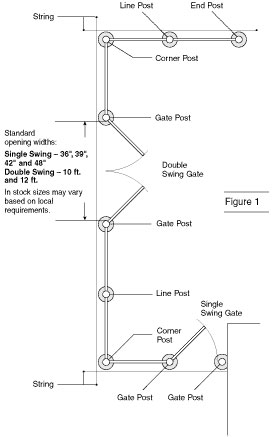
Use the following steps to lay out your chain-link fence.
Before beginning any excavation, check for underground utilities.
Locate your property's boundary lines. It's recommended that all posts be set approximately 4 inches inside the property line so that concrete footings don't encroach onto any adjoining property.
Measure the overall length of your planned fence to determine how many feet of chain-link fabric and top rail will be required (Fig. 1).
Mark the location of each terminal post (corner, end and gateposts are called terminal posts) with a stake. When determining the positions of gateposts, remember that clearance for hinges, latches, etc., is included in the listed opening width of the gate. Therefore, if you ordered a gate for a 36-inch opening, the post spacing should be exactly 36 inches, inside post face to inside post face.
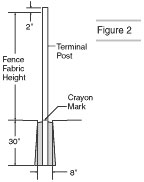
Dig the terminal postholes approximately 8 inches in diameter and 30 inches deep, with sloping sides (Fig. 2). The exact diameter and depth will be determined by local weather and soil conditions.
With crayon or chalk, mark the ground line on the posts. The height, above level ground, of the terminal posts will equal the height of the fence fabric plus 2 inches.
Center the terminal posts in the holes. Make sure the posts are plumb and set at the correct height. (Crayon mark should be at ground level.) Surround the posts with concrete in a continuous pour. Trowel finish around the posts and slope downward to direct water away.

Wrap the tension wire once around the bottom-rail end-band carriage bolt. Using pliers, twist several times to secure (Fig. 12). Tension wire should run along the same side of the posts as the fabric. Apply tension wire clips no more than 24 inches apart or as needed for securing the wire to the chain-link fabric.
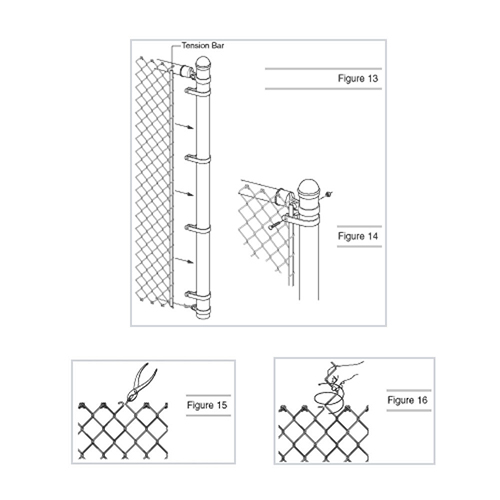
Starting at a terminal post, unroll the chain-link fabric on the ground along the outside of the fence line to the next terminal post. Slide a tension bar through the first row of chain-link diamonds. Fasten evenly spaced tension bands (already on the post) to the tension bar fabric combination using 5/16-inch-by-1-1/4-inch carriage bolts with heads to the outside of the fence (Figs. 13 and 14).
Walk along the fabric and stand it up against the fence frame, taking out the slack as you go. Loosely attach the fabric to the top rail with a few fence ties to hold it in place. Separate enough fabric from the roll to span the opening between the terminal posts.
To remove excess fabric:
Remove the excess fabric with pliers by opening the top and bottom loops (knuckles) of a single strand of wire at the desired point of separation. Unwind the strand up through the links until the fabric comes apart (Figs. 15 and 16).
To splice sections of fabric:
Splice sections of the chain-link fabric together using a single strand of wire, removed from the end of the fabric. Join the two sections by winding the loose strand down, corkscrew style, through the end links. Join and tighten the knuckles at the top and the bottom to secure.
NOTE: Before sections can be spliced, a second strand may have to be removed to provide a proper mesh.

Fasten the fabric securely with fence ties spaced approximately 24 inches apart along the top rail and 12 inches apart on each line post (Fig 19). Finally, securely tighten the nuts on all rail end bands and tension bands.
A similar installation procedure is used on both single-swing and double-swing gates (Figs. 20 and 21).
Apply gatepost hinges to the gatepost approximately 8 inches from the top and the bottom of the gatepost with the top-hinge pin pointing down and the bottom-hinge pin pointing up. This will prevent the gate from being removed or from dropping off. Tighten all bolts securely.
Apply gate frame hinges to the gate frame. Loosely fasten the bolts so they can be easily adjusted on the gate frame. Hang the gate(s) in place so that the bottom of the gate has approximately 2 inches of ground clearance. Tighten the bolts on the bottom frame hinge first, and then adjust and tighten the bolts securely at the top.
Position the gate fork latch at a convenient height. Tighten all bolts securely.
NOTE: Adjust the latch assembly on the double-swing gate to the correct height and tighten all bolts securely (Fig. 21).
Fittings
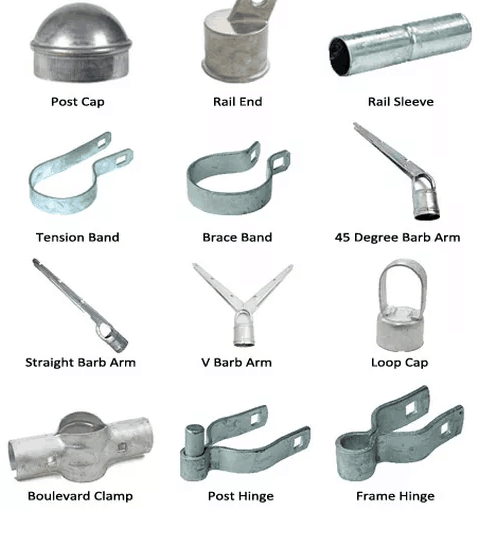
Surface Treatment
The Chain link Fence are manufactured using galvanized steel wire with super-durable powder coating assures a long service life for the fence system.Our powder coating material is the top brand like AkzoNobel,which peovides the industry's Highest Weather-rability and Gloss Retention in U.V.exposure.
The color has RAL256 colors to be chosen.
Razor Barbed Wire
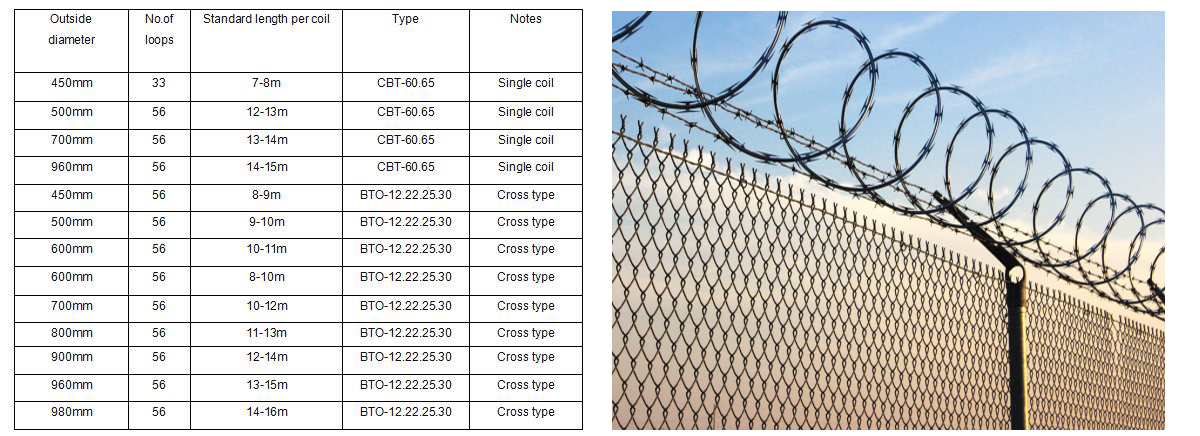
Barbed Wire
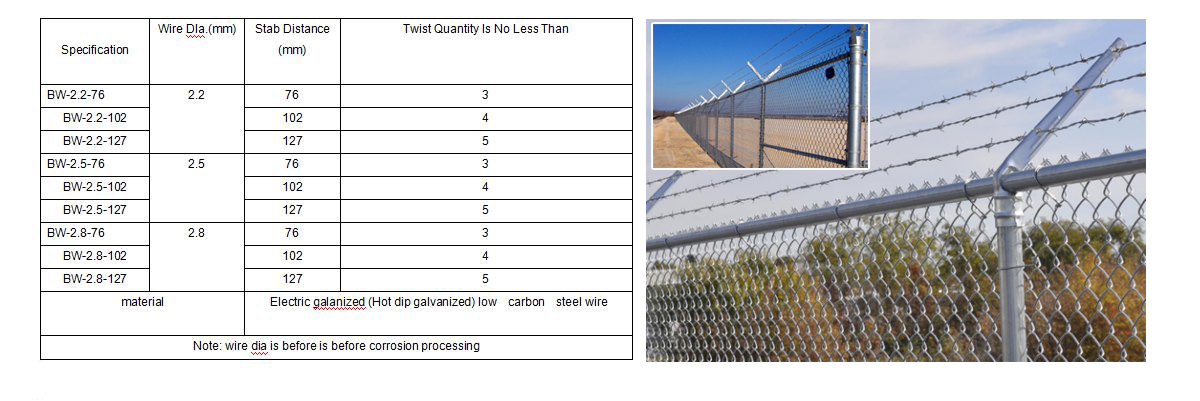
Copyright©Anping Wanzhong Wire Mesh Products Co.,Ltd
Address: Wire Mesh Industrial Zone, Anping County, Hebei Province, China Telephone:+86-318-8090956 +86-318-8090968 Fax:+86-318-8090966 Mobile phone:+8613383180803
Website:www.wzfence.com E-mail: